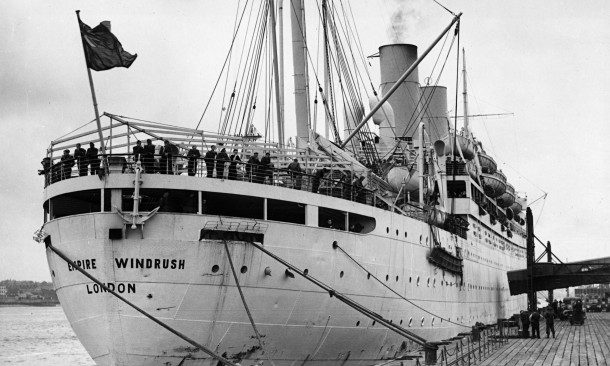Patrick Vernon OBE, political activist and founder of Every Generation Media, writes about the need for a Windrush Day to recognise the migrant contribution to UK society.

In 2008, after making my documentary A Charmed Life which explores the legacy of the Windrush Generation, I started to campaign for Windrush Day to be a public holiday, celebrating not only the African and Caribbean but also the wider migrant contribution and benefits of immigration to Britain since World War Two.
It is very difficult to quantify the enormous legacy of the Windrush Generation. The contribution covers the spectrum of public life, from politics, faith, public services (especially the NHS) to business, music, food, fashion, sports and the arts. It has shaped the nature of multicultural Britain.
The work of heritage organisations like the Windrush Foundation and the Black Cultural Archives – through exhibitions such as Staying Power – along with local museums, archives, writers, and community historians, have played an important role in promoting and sharing this history.
Over the last several years there has a growing interest from faith leaders, politicians, community activists and many other people in public life who now see the importance of a Windrush Day on the 22nd of June, when the ship the MV Empire Windrush docked at Tilbury. To date there has been a letter in the Times newspaper, online petitions, memorial events at Windrush Square in Brixton and other commemorative events around the country.
In June Simon Stevens, the chief executive of the NHS, hosted a Windrush Day event at St Thomas’s Hospital recognising the achievements of migrants to the health service. Sam King MBE, one of the few survivors of the Windrush Ship, was invited as guest of honour.
Cheryl Armatrading (cousin of the famous singer-songwriter Joan Armatrading) will be launching a musical called A Fool’s Paradise as a tribute to the Windrush. I recently attended the rehearsals where I met the cast comprising mainly of young people under 25 years old who are learning for the first time about the Windrush legacy. The production will be travelling around the country and will provide a powerful opportunity and creative process of passing on the narrative to the next generation.
The recognition of Windrush needs to be cemented and mainstreamed in the national curriculum, media and public discourse so that we are seen part of the history of this country and our contribution are recognised and rooted for future generations and not just relegated to Black History Month.
So when we do have a future black Prime Minister, manager of the England football team or Director-General of the BBC (even fictional characters like Dr Who or James Bond) the nation understands the narrative and the history of migration and why black people and minority ethnic communities are here to stay and are part of the future of this country.
We need a social movement in promoting the Windrush Generation and the legacy especially as we move towards 2018 with the 70th anniversary of the ship docking at Tilbury. It would also be significant if David Cameron as Prime Minister along with leaders of the various political parties make a commitment to sustain this legacy in partnership with the community and celebrate the diversity of migrant voices which make up Britain today.
We need a massive education programme in schools, funding earmarked from the Heritage Lottery Fund and support for community organisations and elders groups from the Arts Council to share this history.
More importantly however, we need a national oral history programme to capture all black and minority ethnic elders’ experiences that migrated here between 1948 to the 1960s so we can learn about their lives as part of a permanent archive for future prosperity otherwise we will regret this as a nation and a community.
To mark Windrush Day, war veterans and Windrush pioneers Sam King and Alan Wilmot were at the Karibu Education Centre in Brixton where they shared their early experiences of living in South London during the 1940 and ‘50s and why Brixton became the spiritual home for black people in Britain. With the increased gentrification of Brixton and the new period of austerity, what are the lessons that we can learn from this disappearing generation of elders?
Patrick Vernon will deliver a lunchtime lecture at the Black Cultural Archives on Thursday 9 July called From Oppression to Expression: The rise in Black British Print Culture.







[…] got Windrush Square in Brixton which marks the Caribbean contribution to our community. And Patrick Vernon’s suggestion of a Windrush Day to celebrate the migrant contribution to the UK is an idea whose time has come. […]
[…] got Windrush Square in Brixton which marks the Caribbean contribution to our community. And Patrick Vernon’s suggestion of a Windrush Day to celebrate the migrant contribution to the UK is an idea whose time has come. […]
This is an excellent idea and one which should be supported the length and breadth of the country. I deliver Black history classes in Manchester and I have been amazed at the number of people who have no idea about the Windrush generation. However, my classes of young people are more than keen to learn more about their history. I would be happy to contribute to any such campaign.
Great idea to reflect on the variety of brixton
UKIP keep away…